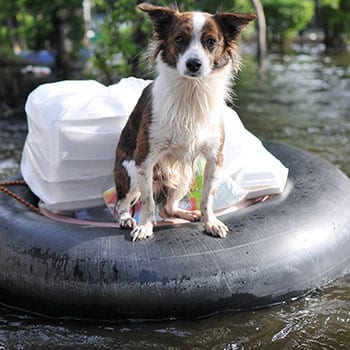Summer in Webster, even with all its warmth, can cause a lot of trouble! Excessive heat, severe weather, and flooding are just a few concerns that cause significant stress to your family and pets. To help you and your cat or dog enjoy summer to its fullest, our animal hospital team has come up with some summer pet safety tips.
Fending off Heatstroke
We all know it gets pretty hot in Webster! Yet, while we have the ability to sweat and recognize our limits, your pet is not so lucky. They can’t sweat like we do, and they don’t always recognize the dangers of heat. Here are a few pointers for keeping your pets cool in the summer sun:
- When outside, always make sure they have plenty of shade and water.
- Take your walks earlier in the morning and later in the evening.
- Be cautious with your pet around water, whether the pool or ocean. Not all breeds of dogs are great swimmers, and even those that are can become fatigued and risk drowning.
- Never leave your pet in a parked car, no matter how quick you’ll be or how mild the weather might seem. A car can heat to dangerous levels in a mere 10 minutes. Your pet’s life is not worth the risk.
Weathering the Storm

Webster is a hotspot for severe weather. Hurricane Harvey is the most recent example of the kind of damage storms can cause to our homes and families. Early planning and preparation are key for keeping your cat or dog safe during the worst weather. Make sure you adhere to the following:
- Have current identification on your pet—both on their collar and as a microchip. Ask your veterinarian about getting your pet microchipped.
- Never leave a pet outdoors in a storm. Bring them inside well before it hits.
- If you’re taking shelter, be sure to familiarize your dog with your shelter space well before you need to use it, and make sure your cat is comfortable in their carrier.
- If told to evacuate, do so early. If you need an emergency evacuation after the storm has hit, a rescue team may not be able to accommodate your pet.
- Have a pet emergency first aid kit ready to go and stocked at all times. Consider including:
- Antiseptic wipes, lotion spray, or powder
- Gauze pads
- Adhesive tape
- Blanket
- Food and water
- Medications if needed
- Leash or muzzle
- Puppy pads or disposable bags
- Vaccination and identification records
- Pillowcase and litter box for cats
- Toys that smell like home for comfort
In Case of Flooding

Flooding causes all sorts of havoc for us and our pets. Much of the advice listed for severe weather applies to flooding, too, but other precautions must also be taken. The extra moisture creates a breeding ground for parasites, bacteria, and insects which can put your cat or dog in danger. Be aware of the following:
- Mosquitoes. These insects thrive in wet climates and some carry heartworms, which can transfer to your dog and even your cat when bitten. Talk to your veterinarian about proper prevention.
- Ringworm. This fungal infection is soil-borne and increases in hot humid weather and can often accompany hotspots.
- Giardia. These parasites live in the small intestine and can be shed through bowel movements of infected animals. Flooding moves contaminated water to your area, causing other animals to become infected.
- Leptospirosis and other bacterial infections. Bacteria loves water and warmth. Lepto and other bacterial infections are spread through contaminated floodwater, infecting pets who come into contact with them.
The best way to prevent your pet from parasites, pests, and bacteria is to get them out of the flood area before it hits. If a flood warning is issued for your area, consider taking your pet to a family member or friend outside of the flood zone. It’s equally important to keep their parasite prevention and vaccinations up to date to keep them protected. Schedule a visit with your veterinarian if your pet is unprotected.
For more information about summer pet safety, please get in touch with our animal hospital! We’d be happy to answer any questions and address your concerns!
